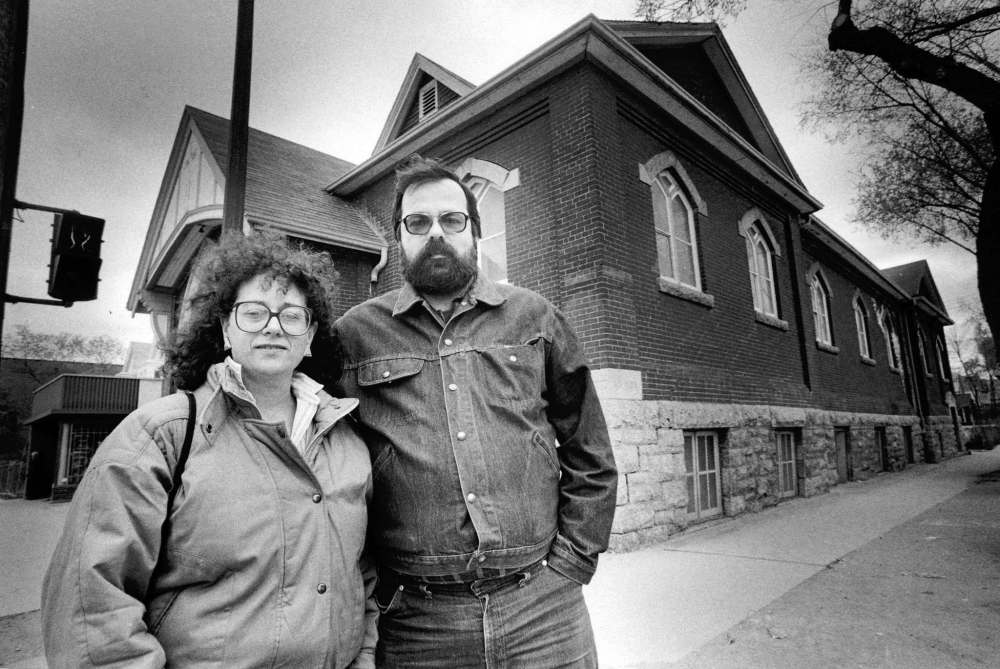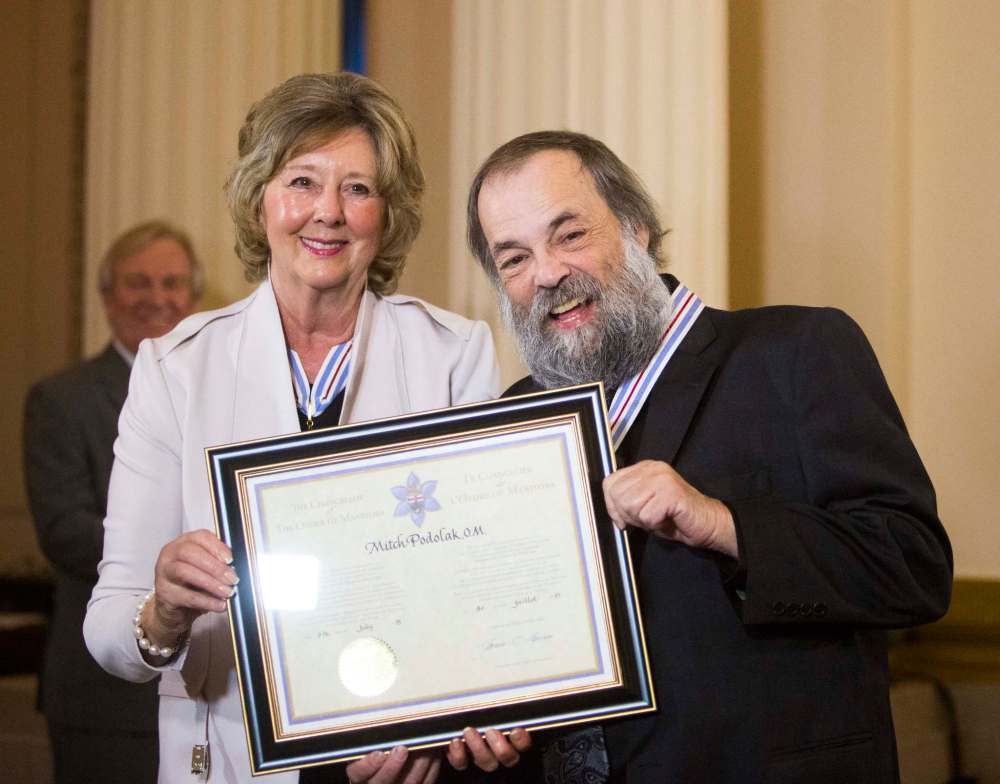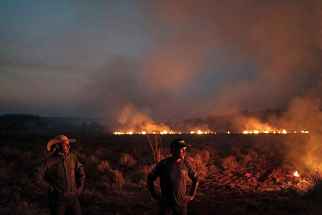Man of the people A rebel and dreamer, Winnipeg Folk Festival founder Mitch Podolak made indelible mark on Canadian music scene
Read this article for free:
or
Already have an account? Log in here »
To continue reading, please subscribe:
Monthly Digital Subscription
$0 for the first 4 weeks*
- Enjoy unlimited reading on winnipegfreepress.com
- Read the E-Edition, our digital replica newspaper
- Access News Break, our award-winning app
- Play interactive puzzles
*No charge for 4 weeks then price increases to the regular rate of $19.00 plus GST every four weeks. Offer available to new and qualified returning subscribers only. Cancel any time.
Monthly Digital Subscription
$4.75/week*
- Enjoy unlimited reading on winnipegfreepress.com
- Read the E-Edition, our digital replica newspaper
- Access News Break, our award-winning app
- Play interactive puzzles
*Billed as $19 plus GST every four weeks. Cancel any time.
To continue reading, please subscribe:
Add Free Press access to your Brandon Sun subscription for only an additional
$1 for the first 4 weeks*
*Your next subscription payment will increase by $1.00 and you will be charged $16.99 plus GST for four weeks. After four weeks, your payment will increase to $23.99 plus GST every four weeks.
Read unlimited articles for free today:
or
Already have an account? Log in here »
Hey there, time traveller!
This article was published 26/08/2019 (2297 days ago), so information in it may no longer be current.
Mitch Podolak attended his final music workshop Sunday.
The 71-year-old, whose legacy includes co-founding the Winnipeg Folk Festival and the West End Cultural Centre, died of complications from septic shock after witnessing one more jam by local musicians and family members in his hospital room.
“We played some songs for him. It was Bright Morning Star I learned from (British folk act) the Oysterband. I sang him that and he was gone,” said his son Leonard Podolak.

It was a fitting tribute for a man who dedicated his life to fostering an environment where musicians and music fans could connect.
“He uplifted hundreds, created work for thousands and created joy for millions,” Leonard said.
Mitch Podolak was born in Toronto on Sept. 21, 1947, the youngest of three children. His clarinet-playing, classical-music-loving father died when he was nine, and he was raised by his mother, sister Alice and brother Mark.
His life and political views changed when Alice took him to see folk musician Pete Seeger at Massey Hall when he was 13, Leonard said.
“He saw Pete Seeger play and the next day he bought a banjo and became a communist,” Leonard said with a laugh.
“He saw Pete Seeger play and the next day he bought a banjo and became a communist.’–Leonard Podolak
He ran a coffeeshop in Toronto and famously turned Neil Young down for a gig because he said he couldn’t sing. (“That was one of his mistakes,” Leonard said.) He headed west to set up a chapter of the Young Socialist Alliance in the late 1960s.
Podolak made radio documentaries for CBC, and he and his wife, Ava Kobrinsky, moved to Winnipeg in the early 1970s, about the time the the city was looking for projects to fund as part of its centennial celebrations.
In 1974, Podolak and partner Colin Gorrie got $77,000 from various levels of government to stage the Winnipeg Centennial Folksong Festival at Birds Hill Park in August. The free event featured 42 artists, with headliners including Bruce Cockburn, Leon Redbone and Murray McLauchlan.
Into the wide blue yonder
Tributes to Mitch Podolak flooded social media when news of his death broke Sunday night. Here are a few tributes from the hundreds posted online and emailed to the Free Press.
“He was fiery and passionate and cared so much about the music and the activism behind it, but even more so, the people. Folk festivals are uniquely special communities with a lot of heart and a huge reliance on volunteers. It really takes a village to build a folk festival and they’ve all developed that way because of the model that Mitch created.
“He was a mentor and he was a friend, to me and to the organization as a whole. He will always be a part of us and what we create in Birds Hill Park for every year to come. We love him and will miss him greatly.”
— Lynne Skromeda, Winnipeg Folk Festival executive director
Tributes to Mitch Podolak flooded social media when news of his death broke Sunday night. Here are a few tributes from the hundreds posted online and emailed to the Free Press.
“Of course the Winnipeg Folk Festival wouldn’t exist if it wasn’t for Mitch starting it all. And it’s not just our festival — he had such a positive impact on so many folk fests, including Edmonton, Vancouver, Canso, Owen Sound… just to name a few.
“He was fiery and passionate and cared so much about the music and the activism behind it, but even more so, the people. Folk festivals are uniquely special communities with a lot of heart and a huge reliance on volunteers. It really takes a village to build a folk festival and they’ve all developed that way because of the model that Mitch created.
“He was a mentor and he was a friend, to me and to the organization as a whole. He will always be a part of us and what we create in Birds Hill Park for every year to come. We love him and will miss him greatly.”
— Lynne Skromeda, Winnipeg Folk Festival executive director
“Mitch was something else, that is for sure. I always enjoyed his company and his many stories. That he seemed to take an interest in me, that he seemed to like and respect me, was important. He was always encouraging and could drive me crazy with all of his ideas, but it was always obvious how much he cared.
“He made things happen and he made people believe not only in his own ideas but in themselves, that they could make those ideas happen.
“The people who tell me their stories about putting up the drywall at the West End, who were painting the walls minutes before the doors opened for the first time, all speak as though they can’t believe it actually happened and continues to happen. There’s something very special about that.”
— Jason Hooper, West End Cultural Centre executive director
“Among various other visions and schemes that Mitch Podolak hatched or tried to, was the idea of getting a folk music festival off the ground in Vancouver. Why Vancouver? Perhaps to evade the ice and snow of Winnipeg or perhaps because of his love of Chinese food?
“In any event he convinced a City of Vancouver cultural poobah, Ernie Fladell, to come up with the dough and a young political comrade, Gary Cristall, to forget about graduate school to co-ordinate the thing. Thus was born what has become an organic and iconic annual event — the Vancouver Folk Music Festival. Mitch was its co-founder and artistic director for the first two years. Much of what he taught us remains at the heart of the festival today. Thanks Mitch.”
— Gary Cristall, co-founder of the Vancouver Folk Festival
“I had wanted to play the Winnipeg Folk Festival and I had just moved to Winnipeg so I got in touch with Mitch. He’s such a character, so he said, ‘OK I’ll come to your house,’ and he came over and I played him a few songs.
“My paintings were all over the walls, and he said, ‘Well I’m gonna give you a piece of advice: Don’t be a musician, be a painter.’ And I said, ‘Well, Mitch I really want to be a musician.’ So he gave me good advice, he hired me to work backstage mainstage that year to give me a feel for the festival and the next year he hired me for the festival. And he went on to buy five paintings.”
— Heather Bishop, musician
“Mitch Podolak has passed over and will now be stirring up sh– in the afterlife. What an amazing man. My friend and mentor — my heart to you for ever. Safe home, Mitch.”
— James Keelaghan, musician
“It is with sadness that we share the news of the passing of Mitch Podolak. He was our dear friend, mentor and co-founder. Many will remember Mitch coming to Canso in those formational days back in 1996 and 1997. He helped us to turn our vision into a living, breathing event that still thrives 24 years later.
“It is impossible to quantify the impacts his knowledge, passion and guidance have brought to us all, our community and our region. Just last November, Chris and I got to spend four days with Mitch working on a plan for the future. He was such an inspiration. His memory will live on through the amazing work he did for countless organizations and events from Canso to Vancouver.”
— Troy and Chris Greencorn, Stan Rogers Folk Festival
“It is more than likely that without the foresight and assistance of Mitch Podolak there would not be an Edmonton Folk Music Festival. It is time to raise a parting glass in his honour. We are forever in your debt, Mitch.”
— Terry Wickham, Edmonton Folk Festival producer
“I’ve just heard that the mighty Mitch Podolak has departed this earth. The man lit so many fires, many of which are still burning… He was a visionary, a card, a comrade and a joker. He loved music and musicians and many of us owe him a debt of gratitude. Too soon gone. Xo Mitch.”
— Stephen Fearing, musician
“Hard to say goodbye to Mitch Podolak. He held the soul of our city in his heart. He made us better friends, made a festival that captured the yearning of people to dance, to sing out loud, to laugh and plan a revolution. He leaves so much love behind.”
— Glen Murray, former mayor of Winnipeg
“This weekend you can hear music of the southern appalachians, of the Canadian Prairies, of the New Orleans honky tonks, of the big cities, of the Irish revolutionaries, of the East Coast fisherman, of farmers and hoboes, rich men and fools and of many of the people that make this world what it is,” Podolak and Gorrie wrote in the festival program.
Podolak would stay with the organization, which became the Winnipeg Folk Festival, until 1986.
“He wanted to make the world a better place,” said Leonard, 44. “The folk festival was a tool of that, that way he could create a utopia one weekend at a time with folk music at the centre.”
The event served as a template for numerous other festivals in North America, and Podolak went on to help found the Vancouver Folk Festival.
‘Folk festivals are uniquely special communities with a lot of heart and a huge reliance on volunteers. It really takes a village to build a folk festival and they’ve all developed that way because of the model that Mitch created,” Winnipeg Folk Festival executive director Lynne Skromeda said.
“He was a mentor and he was a friend, to me and to the organization as a whole. He will always be a part of us and what we create in Birds Hill Park for every year to come. We love him and will miss him greatly.”

Podolak’s next local passion project was the renovation of a former church at the intersection of Ellice Avenue and Sherbrook Street, which opened as the West End Cultural Centre in 1987, and continues as a live-music venue to this day.
“The people who tell me their stories about putting up the drywall at the West End, who were painting the walls minutes before the doors opened for the first time, all speak as though they can’t believe it actually happened and continues to happen. There’s something very special about that,” said Jason Hooper, the West End Cultural Centre’s executive director.
In 2007, Podolak started the house-concert touring circuit Home Routes as a way to provide musicians with more opportunities to perform across the country, including in small towns without any music venues.
“It’s such a simple idea: we give people 12 gigs in 14 days, everybody puts them up and feeds them, so performers go home with money and they can buy groceries and pay their rent,” he told the Winnipeg Free Press in 2010.
The project was a natural extension of who he was, said Leonard, who, inspired by his father, went on to become a musician, playing in bands such as the Juno Award-winning/Grammy nominated traditional group the Duhks, and now runs Home Routes.
“That was just the kind of stuff he would do: help foster the community of folk music. It’s a tribe that exists globally, and folk music is a function of a goal of making the world a better place and championing human beings, the environment, sustainability and justice,” he said.
Good times, great tunes: Folk Fest co-founder reminisces about the early days

Posted:
In 2015, the Free Press sat down with Winnipeg Folk Festival legend Mitch Podolak and asked him to flip through a pile of archival photographs of the event he founded 41 years ago.
Podolak put his organizational skills to work for various causes over the years, raising money for American folk legend Utah Phillips with a benefit show in 2007 when the musician couldn’t tour anymore owing to congestive heart failure.
In about 1990, according to testimony during the inquiry into David Milgaard’s wrongful conviction, Podolak helped Joyce Milgaard write and record a song about her son’s case, which was sent to the justice minister.
“He got a posse of Winnipeg musicians together behind Joyce Milgaard and they had a press conference at the West End Cultural Centre and got some press,” Leonard said. “It was picked up by Now magazine in Toronto and made national news.”
The impact Podolak had on the community was evident when he needed help.
In 2016, he fell and sustained an injury that required him to undergo surgery on his cervical vertebrae. He needed to use a wheelchair following the surgery, so the initial plan was to retrofit his two-storey Wolseley home.
Local musician Heather Bishop set up a GoFundMe campaign with the goal of raising $20,000 — an amount the fund raised in one day.
“That’s the kind of guy Mitch was. He gave everything he had to the music business, so when he was in trouble, he had no backup, and I knew that,” Bishop said. “And I also knew that if people knew he needed help, they’d be there. And in an instant we raised 40-some-thousand dollars.”
Retrofitting the house proved unrealistic, so the money was used to help fund a condo where Podolak and Kobrinsky had been living until Podolak was hospitalized last month.
His work earned him accolades from every corner of society. In 2015, he was made a member of the Order of Manitoba; the same year, he received an honorary doctor of laws from Brandon University.

In 2013, he was recognized with a lifetime achievement honour, the Unsung Hero Award, from the Canadian Folk Music Awards.
We are incredibly saddened to share that our founder Mitch Podolak has passed away. Words cannot express how much he will be missed. More than one of our founders, he was a father, a friend, a leader, a mentor, a true visionary. We owe so much of who we are to him. (1/2) pic.twitter.com/h97XUMljjj
— Winnipeg Folk Fest (@Winnipegfolk) August 26, 2019
“Mitch was a giant figure, and the swath he left was so huge; you would be hard-pressed to find a folk musician in this country who was not at least influenced by him, if not absolutely helped,” Bishop said.
As helpful as he was to the artists, he could also rub some people the wrong way with his straightforward manner, Leonard said.
“He was one of a kind and they don’t make them like that anymore… but he wasn’t perfect. He pissed off a lot of folks. His brashness didn’t always serve him. He was so stuck by his principles. If he lost some rich person’s money, he was, ‘Oh well, he was rich,’ instead of ‘Oh well, too bad it didn’t work out,’” Leonard said with a laugh.
“His vision of socialism and his vision of communism — I guess people would refer to it as the ideal way of looking at it — is we have enough resources for everybody, so if we could ensure everyone was educated and had health care and we lifted up everyone, we all as individuals would flourish. It’s rise up instead of trickle down.”
Podolak’s family — which includes Zeke and Max Preston, the sons of a close childhood friend whom he and Kobrinsky took in after her death — is in the process of organizing a memorial service for family and friends, and are exploring the idea of holding a larger community celebration of life that anyone could attend.
“He’s going to be here forever,” Leonard said. “Everybody has a Mitch story and the community he created around him.”
— with files from Erin Lebar and Jen Zoratti
rob.williams@freepress.mb.ca
History
Updated on Tuesday, August 27, 2019 11:11 AM CDT: adds info about the Duhks












